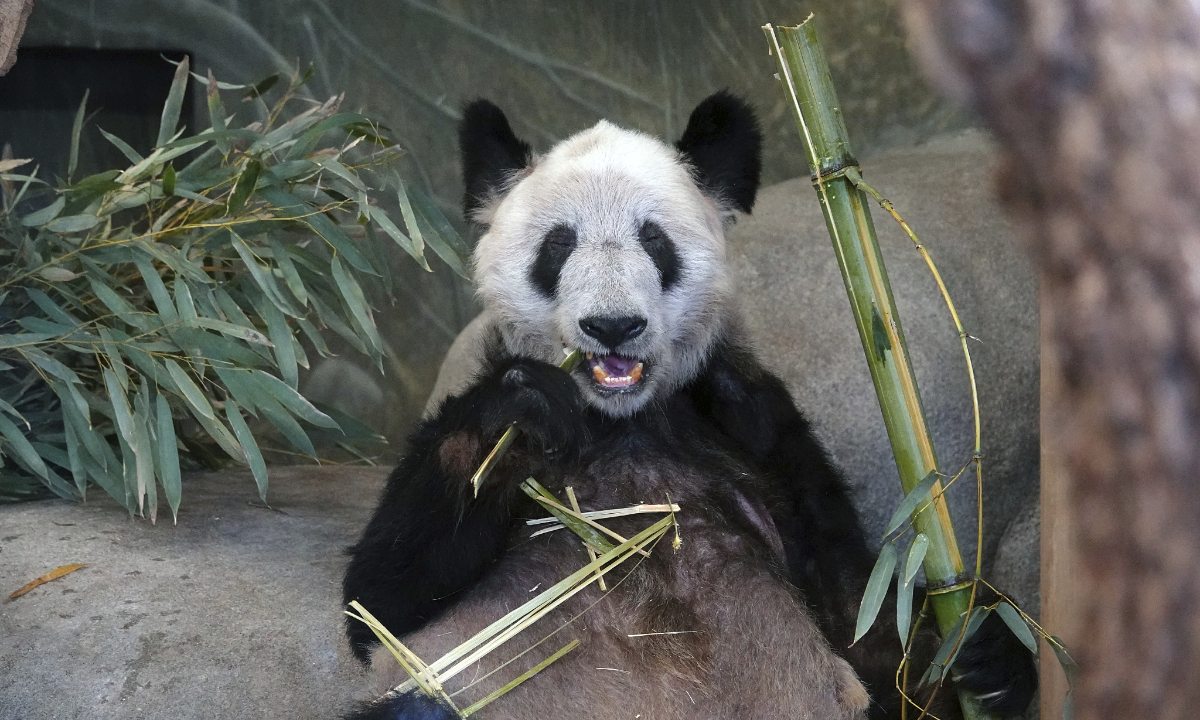CNN arrogantly distorts Chinese care about giant panda Ya Ya, catering to political correctness

Ya Ya, a giant panda at the Memphis Zoo, eats bamboo in Memphis, Tennessee, US, April 8, 2023. Photo:VCG
On Thursday, the giant panda Ya Ya, who had been living in the US for 20 years, landed in China. Ya Ya's return was highly anticipated and joyful.
However, CNN has published an article on Wednesday, entitled, "'Bring Ya Ya home': How a panda in the US turbocharged Chinese nationalist sentiment," using the panda's homecoming trip to create hype. CNN not only misinterpreted Chinese people's attention to Ya Ya as a symbol of Chinese nationalism, but also claimed that the Chinese media uses pandas to fan anti-US sentiment.
CNN discusses Chinese people's concerns about giant pandas from the perspective of nationalism. This undoubtedly caters to the politically correct atmosphere in the US, which aims at distorting the image of China, and inciting the unhealthy mood and atmosphere towards China.
Xu Liang, an associate professor at the School of International Relations, Beijing International Studies University, noted that CNN's perspective is full of self-abasement and arrogance. It is quite normal for Chinese people to care about the panda, as Ya Ya is like one of us. CNN's reaction is excessive. Putting oneself in another's shoes, would Americans not care about the well-being of American citizens overseas? Moreover, the panda is a national treasure of China.
Since the two giant pandas were sent to the National Zoo in the US in 1972, to the return of Ya Ya to China, the giant panda has played a pivotal role as a symbol of friendly exchanges between China and the US. These cute giant pandas, being unique to China, carry a special mission.
Lending giant pandas is not just a "diplomacy," nor is it just to bring more tourists to local zoos. The key is to carry the friendly and close cultural exchanges between China and other countries and regions.
However, Western media, starting from their own perspective, repeatedly emphasizes the political symbolism of giant pandas in reporting on "panda diplomacy," and even turns it into a weapon to demonize China's image. Such reports are a misinterpretation of "panda diplomacy" and a destruction of friendly exchanges between the Chinese and American people.
Xu pointed out that "panda diplomacy" has always been tasked with the mission of peace and friendship, and it itself is borderless and transcends time and space. Because peace and friendship are important connotations of a community with a shared future for mankind. "Panda diplomacy" is essentially to promote friendly exchanges between the Chinese and American people, endowing the national treasure with special diplomatic significance.
"Western media's demonization of panda diplomacy is essentially a need to suppress China in recent years, and it is also a typical manifestation of psychological distortion," Xu said.
Americans have shown a positive and keen interest in pandas. This can be reflected in many American panda fans' social media accounts. The systematic demonization of non-political Chinese cultural elements such as pandas by the US media is a manifestation of the return of Cold War thinking. This shows that such media have not played a good role in building bridges between two sides, but instead acted as political henchmen.
Regardless of yesterday, today, or tomorrow, and no matter where we are in the world, it cannot be denied that pandas have always carried the mission of promoting peace and friendship. And this is precisely what the turbulent world today needs to inject stability and certainty.
